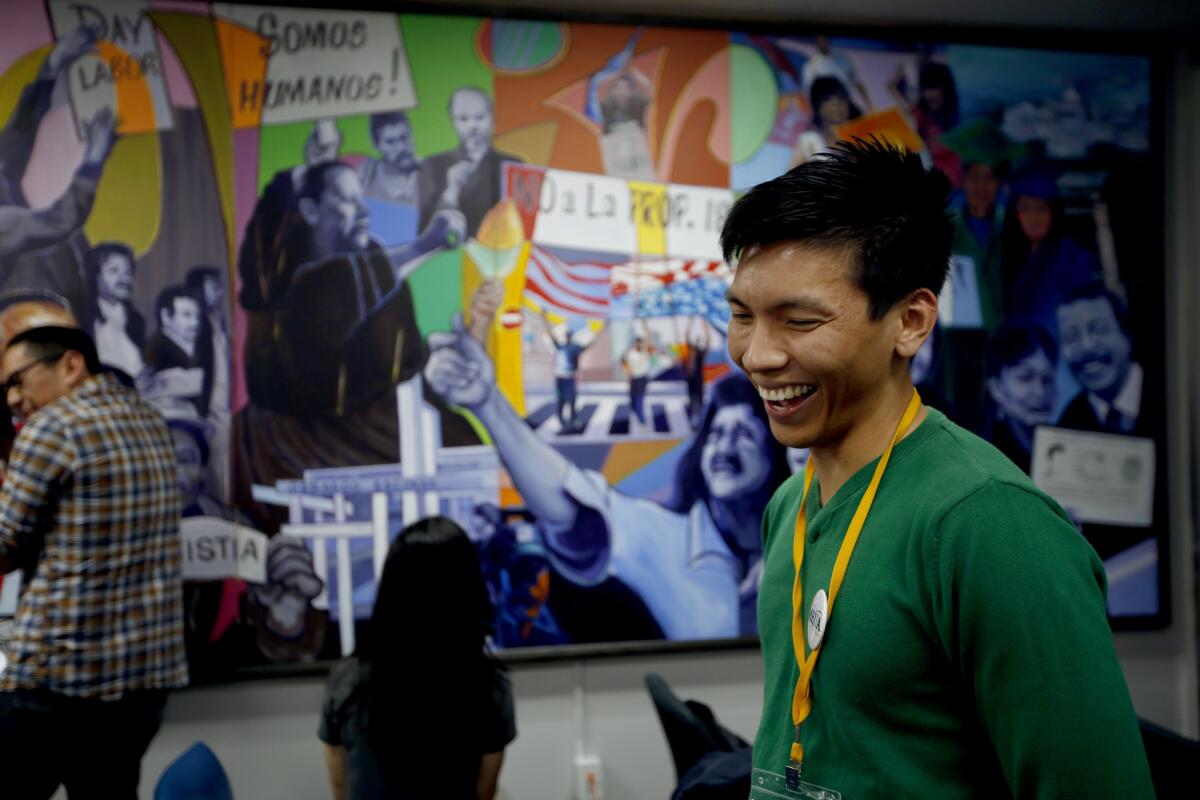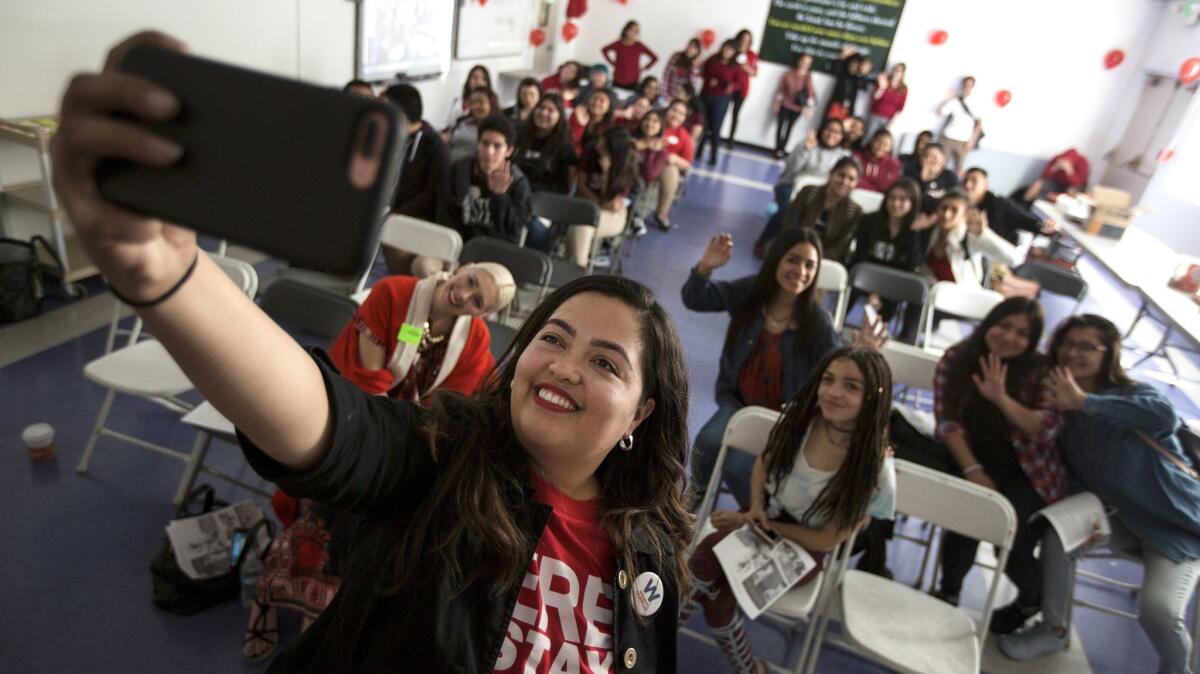The latest test of the Bernie Sanders movement may be in this L.A. race for Congress

The Los Angeles race for the congressional seat left open vacated by Xavier Becerra when he was appointed California’s attorney general is being heavily influenced by Sen. Bernie Sanders. (March 15, 2017) (Sign up for our free video newsletter here
- Share via
In the heart of Los Angeles, the race among nearly two dozen candidates for the congressional seat left open by Xavier Becerra is being heavily influenced by a man who lives more than 2,900 miles away.
Vermont Sen. Bernie Sanders’ progressive ideas, which won him a national following and helped him capture the district from Hillary Clinton in the primary last year, have given the race a decidedly leftward tilt in the heavily Democratic enclave.
At least three candidates in the 34th District say Sanders, in part, inspired them to run. Candidate forums and campaign events ahead of the April 4 primary abound with references to ridding politics of money and fighting the Democratic establishment, in addition to opposing President Trump.
With 19 Democrats running and no anointed standard-bearer for the Sanders wing of the party, it’s unclear whether voters will advance a Sanders-style candidate into what is expected to be a runoff between the top two finishers June 6.
Still, the first congressional primary since Trump was elected could demonstrate how “Berniecrats” can affect future Democratic races across the country.
If any contest this year might reflect the staying power of Sanders’ movement, it’s this one: In an early poll of likely voters, a majority believed Sanders would have beaten Trump had he been the Democratic nominee, and nearly half agreed that the Democratic Party “has been taken over by corporate interests.”
The survey, conducted by Latino Decisions, suggested an endorsement from Sanders would hold sway with more than 70% of voters. So far, Sanders has not picked a favorite.
The three candidates running most visibly on the Sanders agenda are Arturo Carmona, Sanders’ deputy political director during the presidential campaign; Wendy Carrillo, a labor activist and former journalist who recently spent several weeks protesting the Dakota Access pipeline at Standing Rock; and Kenneth Mejia, a Green Party candidate who said he quit the Democratic Party over its corrupt politics.
On a recent evening, Rich Pelletier, a deputy campaign manager for Sanders’ presidential bid, stood before a few dozen supporters at a fundraiser for Carmona.
“This race...is the tipping point,” Pelletier told the crowd gathered in a restaurant overlooking the Staples Center. “This is the race that can set us on a path where we have true progressive champions representing us in Congress.”
Dubbed “Berning Up LA,” anti-establishment sentiment at the event was sharp. Many applauded when a comedian used an expletive to describe Democratic Sen. Dianne Feinstein and remarked it seemed amazing that progressive activists needed to pressure her to stand up for their values.
Taking the stage, Carmona railed against “machine politics” in Los Angeles and accused party insiders of picking favorites. “According to them, this race is over, but we’re going to surprise them,” he said as they responded with chants of “Feel the Bern!”

At another candidate forum, Kenneth Mejia sounded like an evangelist as he paced through the crowd, saying, “We have candidates here who want to try to pass progressive legislation but how are you gonna do that in a Democratic Party … that wants to cater to Wall Street?”
The implied target of such jabs is Assemblyman Jimmy Gomez, a former union organizer who has the support of dozens of elected officials including Becerra, a major Clinton backer. Gomez, a third-term legislator, has perfect scores from key progressive groups such as the League of Conservation Voters, Planned Parenthood, Equality California and the California Labor Federation.
But supporters of Carmona and Mejia have pointed out that Gomez, as a legislator, has taken campaign contributions from pharmaceutical companies and private prison companies, and suggested he is beholden to special interests. When local party delegates voted overwhelmingly to grant the California Democratic Party endorsement to Gomez, Carmona, Carrillo and others released a statement likening the process to “dirty tricks.”
Sanders supporters largely agree their greatest foe in the race is Gomez, but no clear “Bernie” candidate has emerged.
“If Jimmy Gomez is too conservative for this district, and that would’ve been laughable just two years ago, that should tell you where the body politic is going,” Democratic strategist Eric Hacopian said.
Carrillo, an early Sanders supporter who helped house his campaign workers in Los Angeles, recently won endorsements from a trio of prominent Sanders backers, including his former deputy campaign manager, Rania Batrice. In a statement, Batrice noted “the countless hours” Carillo volunteered for Sanders and her protest of the Dakota Access pipeline. “Wendy walks the talk,” she wrote.

Carmona has support from dozens of former Sanders advisors and delegates, and Mejia has mostly attracted supporters from the movement’s far-left wing, many of whom abandoned the party to follow Jill Stein and other Green Party activists.
Our Revolution, the political group Sanders launched that’s helped progressive candidates raise money, has declined to endorse a candidate in the primary.
“We listened to our supporters, and the base is split. We don’t want to go against the people who are there on the ground, doing the work,” said Executive Director Shannon Jackson.
Yolanda Gonzalez, a Sanders “supervolunteer,” joined the Green Party and is now backing Mejia.
“A lot of us that were very united with Bernie, we are at that fork in the road,” Gonzalez said. “Bernie was always for the worker, and that is what I see in Kenneth.” Gonzalez, who has roots in the district but no longer lives there, has been canvassing for Mejia.
Eden McFadden, an event coordinator and former Sanders delegate, said that though she considers Mejia a friend, she’s supporting Carmona because she saw him as a “real progressive” who “actually stood a solid chance of getting elected.”
With the Sanders supporters unable to line up behind a single candidate, the chances for any of the “Bernie” candidates seem slim, Democratic strategist Doug Herman said. He predicts turnout in the primary could dip into the single digits, particularly following a countywide election with 16% voter turnout that returned many incumbents to office. A Times analysis of likely voter data provided by Political Data shows many pockets of the district that went for Sanders have more voters who are considered less likely to turn out. With the Democratic field so fractured, Herman says it’s actually more likely that Gomez will face off with the sole Republican in the race, coasting to election June 6.
But Hacopian said the 2016 election proved that trying to predict how new voters will behave is fruitless.
He points to recent Democratic Party delegate elections, in which Sanders-inspired groups turned out hundreds more Democrats than usual and helped elect progressive slates of candidates in local caucuses up and down the state.
At the very least, Hacopian said, the prominence of Sanders’ agenda in this race points to politics tilting further left in California, where top-two runoffs leave room for battles between progressive and moderate Democrats in safe seats.
“There are definitely things at work here that are emblematic of fights that will take place in the next two, four, six or eight years in the Democratic Party.”
Times staff writers Javier Panzar and Jon Schleuss contributed to this report.
For more on California politics, follow @cmaiduc.
ALSO
The ‘Bernie vote’ is split in the race to replace Xavier Becerra in Congress
This is Bernie Sanders’ plan to lead Democrats out of the wilderness
Updates on California politics











